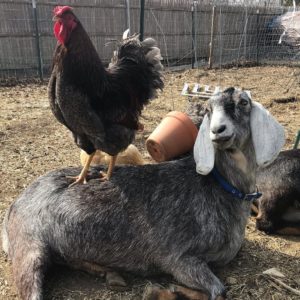Rosh Chodesh Elul, 5779
By Rabbi Aaron Philmus
Temple Torat Yisrael, Rhode Island

Sheep, goats, cows, camels and donkeys… Domesticated animals get almost as much air-time in the Torah as people do, yet we so rarely reflect on our relationship with them. We may have a soft spot for dogs and cats, but what about the animals that feed us and clothe us every day? What about the animals that give us parchment for Torah, wool for Tallit, and skin for tefillin? The Mishna tells us that along with Rosh Hashanah for the people and the trees, there is also a New Year for the tithing of animals on the 1st of Elul called Rosh HaShanah La-Behemah. Elul is also a time of cheshbon hanefesh (accounting of the soul), so when we hear the blast of the ram’s horn, let us attune ourselves to the cries of the animals who cannot advocate for their own welfare.
As I type these words, my goats are crying out for me to take them on a walk in the woods. I can hear my chickens alarming, “buk buk buk buh-GAHK!” When I look out the window, there is a mob of crows dive-bombing a hawk. It was important to me that I find a pulpit with a parsonage where I could be immersed in nature. The Jewish author and goatherd Brad Kessler writes, “The more time we spend around other non-humans the less exceptional human consciousness seems, the more open we become to other ways of seeing.” Raising animals from birth, protecting them from predators, and eating their milk and eggs has given my family a deep connection to the more-than-human world.
Since we let our hens sit on their eggs, we naturally get a lot of baby chicks. Now, there are so many roosters that our hens’ backs are plucked raw from all the mating. I have to cull the flock but I don’t have the heart to do it. I have learned that raising livestock also means raising “deadstock.” For example, if you want milk first you need to breed your animals. This year one of our does gave birth to two billy (boy) goats, which left us with a dilemma. We don’t have enough room to keep them separate, which is necessary because as they mature they can become aggressive and will mate with all the does. The only one who will buy them is a Muslim friend who wants them for meat.
The 1st of Elul was the beginning of a new tithing year for animals, when the shepherd had to decide who shall live and who shall die. It is no coincidence that life and death is also a central theme of the New Year for humans. Our ancestors lived so close to their animals that they saw G-d as their shepherd tithing the flock annually in the month of Tishrei. The prayer Unetaneh Tokef expresses this concept hauntingly, “… all creatures shall parade before you as a herd of sheep. As a shepherd herds his flock, directing his sheep to pass under his staff, so too you shall pass, count, and record the souls of all living, and decree a limit to each persons days, and inscribe their final judgment.”
Since most of us no longer live this way, what might a New Year for Animals look like today?
Rabbi Jonathan Wittenberg suggests we accompany the sound of the shofar with liturgy of repentance, “For the sins we’ve committed in cruelty to lives with no political voice or economic power”; and praise, “Praise God, wild and domestic animals, creeping creatures and birds on the wing” (Psalm 148).
- Here is a kavanah to say before the shofar blowing in Elul by Aharon Varady.
- And an excellent source sheet also by Aharon Varady from the Open Siddur Project.
- You might also try an activity called “The Council of All Beings,” where participants choose an animal (or any non-human being) and through reflection in nature, mask making, and face painting they take on the persona of that being. Then they come together “in council” to talk about what is happening to the planet from their perspective. Discussions can include preventing Tzaar Baalei Chayim (the suffering of animals), and our responsibility as Shomrei Adamah (caretakers of the earth) to not let the earth become a wasteland.
- You could also try holding a special food event for your synagogue featuring vegan dishes or ethical/sustainable animal products like meat from Grow and Behold
The Hazon Rabbinical Council wishes you a happy Rosh Hashanah LaBehemah!




Comments are closed.